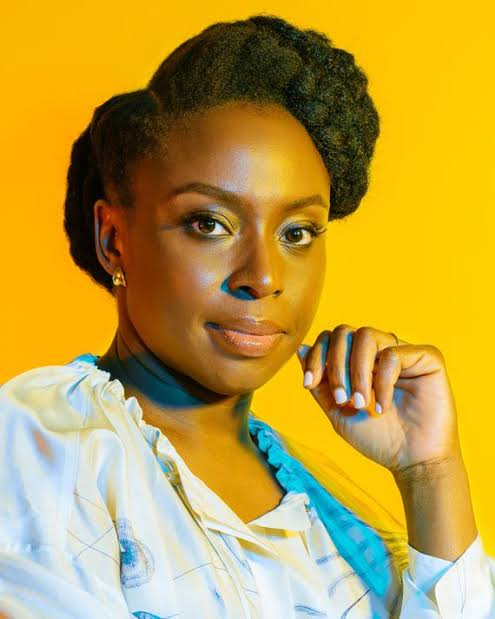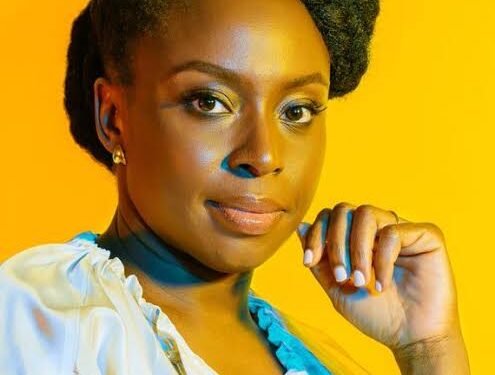By Chimamanda Ngozi Adichie
My father was a professor, and we lived on the University of Nigeria campus in a house full of books; bougainvillea plants lined our driveway in splashes of purple. This was the small, gated world of my childhood: I went to the university primary school, the university children’s library, the university chapel for Sunday Mass. Everyone was similar—safe and sedate academic people—our lives circumscribed by the tended campus hedges.
In my teenage years, I walked two streets to the university secondary school, whose reputation attracted people from out of town, especially the children of wealthy traders from Onitsha, the location of the largest market in West Africa, that bastion of unsophisticated chaos. For the first time I knew people who were not like us. Bush was the word we used for their gaudy style, their mixed-up English tenses, their imported school sandals.
Echezona’s sandals were orangey brown with wedge heels, and he walked in a comical strut. He was popular and brash, a ringleader of boys; he often missed school and got into trouble with teachers and loitered during class hours. I was utterly uninterested in Onitsha boys like him until one day, I was so aware of Echezona the air pulsed if he passed by. How strange that a feeling can grow unprompted, from nothing, surprising even your own heart. I began combing my short Afro more carefully, looking in the mirror to see not myself but myself as seen by him. I was 14 and he was 16. I was an academic star and he had abysmal grades. I wasn’t sure he liked me—I was his junior after all—until his friends came to me to say, “Echezona wants to talk to you.”
“Then he should come himself,” I replied, falsely cool.
The first time he walked me home, he was quiet, almost solemn, his eyes trained ahead or downward, never once turning to me. I thought he was being superior until I realized with surprise that he was shy. To sense his shyness was to feel the intimacy of discovery, of seeing a different version of a person, suddenly known only to you. He took to walking me home. “I want us to be boyfriend and girlfriend,” he would say, and I would reply, “I have to think about it,” even though I wanted nothing more. One day I said yes. And so began a cracking open of my sheltered world. A rush of new bewildering air. My unlikely first boyfriend. His was an exquisite attentiveness, open and faltering, reaching but not quite holding my hand. Often, his skin brushed against mine. He treated me with care and a kind of fear, as though I might fall and break into pieces. (I thought of him when I overheard an aunt say in Igbo, “A man must hold you like an egg.”) I was not to be rushed, and so it was months before the trembling deliciousness of my life’s first kiss, standing near the quarters in our backyard where our house help lived.
“You are the finest and most intelligent girl I’ve ever seen,” he told me.

I was held bound by his animation, his exaggerations. He believed in ghosts and blood betrothals. He wanted us to swear that no matter what happened we would wait for each other and get married. He said he would throw himself in the path of a car if I ever stopped talking to him. He made me laugh and laugh; he was serious but difficult to take seriously. He told obvious lies. He would miss school and, while walking normally, say he had broken his leg the day before. I was unimpressed with his indifference to school, but fascinated, nonetheless. He never read anything. In his sparse notebooks, his childish, unformed handwriting was endearing to me. The first time he gave me a love letter, I knew he had not written it himself; his friend had. The same friend who came to my class one morning during the harmattan season and held out Echezona’s red sweater. “Echezona said you look cold.” I slipped my arms, myself, into that woolen softness, and long after the morning cool had given way to a fierce sun, I still wore his sweater.
“What do you even talk about?” my university campus friends asked, their faces stricken, as if I had gone mad, and in their eyes the unspoken words bush boy, rough boy, unsuitable boy.
I don’t remember, and what I remember I don’t always trust. Memory fades but it also self-selects. Our memories try to protect us, and often what slips from our remembering is what is best left behind. I barely remember that I heard Echezona stole money from his father and tried to bribe a teacher for test questions. I remember how his face lit up each time he saw me, his grin impish and boyish and eager to please. I remember the ease of being with him, how sullen I was when he missed school, how bereft during vacations when I spent hours on the phone in my father’s study trying to get through the crackling Onitsha lines. On my birthday he gave me a scented satin rose. The perfumy scent became overpowering if you shook the tall case in which it came. I hid it in a cupboard because I feared my mother would ask me to return such an expensive, inappropriate gift. It was shortly after my birthday that he told me he was leaving, his father was sending him to a tough boarding school, but we would remain together no matter what. I cried, as if I sensed how quickly we would lose touch, our letters and phone calls trailing away, and how soon I would have a new boyfriend from my world, a professor’s son.
Echezona died in my first year of university. A friend walked up to me as a lecture hall emptied out to say that Echezona had been shot at a bank in Lagos; he was driving in to deposit a check when armed robbers ran in and started shooting. I stared blankly. I was used to stories of robbers who climbed through unlocked windows at night to steal televisions from campus homes. The extreme, random violence felt so far away as to be surreal. It couldn’t be. I couldn’t cry. For months I carried this news without looking at it until, in a horrific coincidence, I went to a newspaper office in Lagos for my first-ever interview as a writer after publishing a book of poems, and the journalist showed me a wall of award-winning photographs that stilled my body in shock. The journalist asked what was wrong, and I pointed at a photograph.
“You knew him? I’m sorry. It was a terrible robbery at the bank nearby.”
Echezona’s head was slumped against the car seat; his blood a deep gray in the black-and-white photo.
I will always remember the existential sagging of my spirit, as if something I longed for would now never be. And something I wished untrue was now forever true.
I kept trying to erase that image from my mind, to replace it with his walk, his laughter, his easy switch from shy to outrageous and back again. That photo forced an acceptance on me: He really was gone. I had not heard from him in three years, we were old enough to be separated by our interests, and I knew when he left my school that we were unlikely ever to be together again. Yet I mourned the future that would now never be. With the pain and sadness came a strange sensation of having been cheated. He was my first love, but in dying, he became an idealized future that I could have had. Maybe this is why my new novel, Dream Count, is haunted by the idea of the one who could have been, the one made perfect by loss. After I left the newspaper office, I began desperately searching through a pile of old things for the card he brought me when I was sick with malaria, the only piece of his handwriting I had. Inside the card, written in his uniquely shaky hand were the words: To my one love Ngozi, from your own Echezona.







